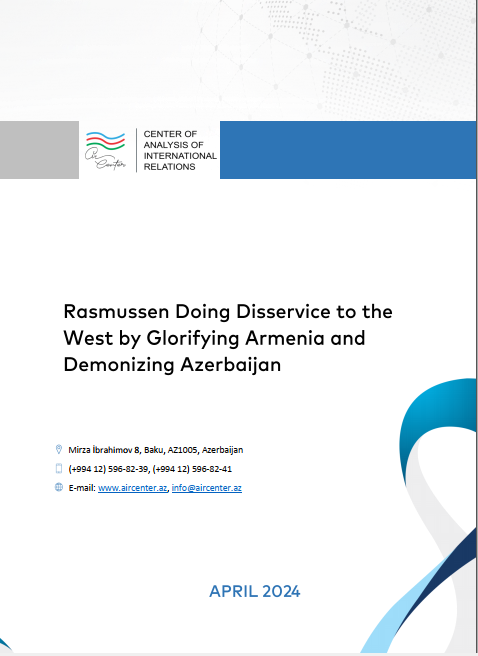The Center of Analysis of International Relations (AIR Center) has responded to the report titled “Deepening EU-Armenia Relations: More Europe in Armenia; More Armenia in Europe,” dated March 7, 2024, prepared by the Friends of Armenia Network, a group led by former Danish Prime Minister and NATO Secretary General Anders Fogh Rasmussen.
The AIR Center’s report reads that offering a list of policy recommendations for enhancing Armenia’s relations with the EU is a noble objective, and this is not in contradiction with Azerbaijan’s interests. Thus, the EU, as the main trading partner of Azerbaijan, sharing the country’s 65 percent of overall foreign trade, is welcomed in Baku.
However, Azerbaijan is concerned regarding certain political and expert groups within Armenia and the EU, who conduct these campaigns aimed at intensifying EU-Armenia relations through the distortion of facts, demonization of Azerbaijan, and misrepresentation of local realities.
Such tactics are counterproductive and detrimental to the interests of Armenia, the wider region, as well as those of the EU. The recent report by Rasmussen Global exemplifies this, presenting biased and distorted information that fosters false hopes and expectations within Armenian society.
Thus, the sentence “Azerbaijan continues to pose a military threat and is signaling that it will attack Armenia” mentioned throughout Rasmussen Global’s report in various forms is a deliberate effort to fabricate a nonexistent threat under the guise of Azerbaijan, thereby justifying increased military assistance to Armenia and bolstering the Western presence in the country.
Azerbaijan, at the highest level, has unequivocally refuted any intentions or preparations for a military operation against Armenia. President Ilham Aliyev of Azerbaijan stated emphatically in early December 2023, “We have no plans to occupy the territory of Armenia, and they periodically accuse us of this… We don’t want this,” reiterating similar sentiments on numerous occasions.
Nevertheless, certain political groups in Armenia and the West persist in accusing Azerbaijan of harboring territorial ambitions against Armenia. In this regard, Rasmussen Global functions akin to a propaganda arm of the Armenian government.
In the meantime, contrary to the assertions made by Rasmussen Global, Armenia’s trade with Russia has actually thrived in the past two years since the onset of Russia’s conflict with Ukraine. This growth can be attributed primarily to the circumvention of Western sanctions and the re-export of sanctioned goods.
At the same time, Rasmussen Global’s report claims that the Collective Security Treaty Organization (CSTO) and Russia have provided little support to Armenia for its defense against “Azerbaijan’s aggression.” However, it is well documented that, taking immense advantage of its alliance with Russia, Armenia, with a population of approximately 2 million, was able to occupy territories belonging to neighboring Azerbaijan, with a population exceeding 7 million, in the early 1990s. The dependency on Russia at the expense of the country’s sovereignty was the price Armenia agreed to pay in return for Russian support in the occupation of the Azerbaijani territories. Therefore, what the report by Rasmussen Global presents as a “security provider” was, in reality, an ally aiding Armenia’s expansionist policy in the region.
According to the AIR Center’s report, Rasmussen Global’s report was launched amid Azerbaijan’s growing role in Europe’s energy security, and it will certainly not contribute to the peace process between Armenia and Azerbaijan.
“By prioritizing narrow financial interests over objectivity and fairness, Rasmussen and his consultancy firm not only risk undermining the interests of Western allies but also perpetuate tensions in the already volatile South Caucasus region. It is therefore imperative for everyone, including policymakers, international organizations, and civil society actors, to remain vigilant against such biased lobbying efforts and work towards promoting a more balanced and inclusive approach to conflict resolution in the South Caucasus. Genuine peace and stability can only be achieved through dialogue, mutual respect, and a commitment to addressing the legitimate concerns and aspirations of all parties involved,” the report concluded.
*Read the full text of the AIR Center’s response via the link below:
https://aircenter.az/uploads/A3oIG4dXqaNv.pdf




